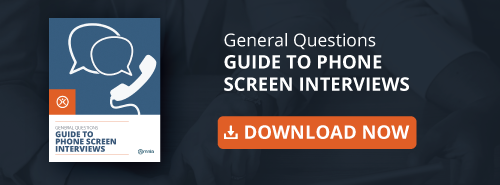You have a list of candidates that made it past your resume screening process. Eager to make that next great hire, you’re excited about the possibilities in front of you. Now what? Do you immediately schedule them for an in-person interview? Or do you conduct a phone interview first? If phone screens are not in your current process, you might want to reconsider. They can be an effective way to save time while learning a lot about a candidate.
The purpose of the pre-employment phone interview is to quickly assess the candidate’s ability to meet the minimum requirements of the position, as well as their ability to communicate clearly over the phone – super important if you are considering them for a job with lots of phone contact, such as sales or customer service. If your customers are only going to hear this employee talk on the phone, so should you. Nothing is more frustrating than getting fully into the in-person interview before discovering they can’t articulate themselves. Take it as a great opportunity to evaluate phone etiquette and communication style.
Tip: Pay attention to tone, inflection, and clarity of the candidate when answering questions, as well as background noise
I once interviewed an accounting candidate who sounded like she was calling from a rock concert. She wasn’t. When I told her that it was challenging to hear a word she was saying and asked where she was, she said, “I’m home. My roommate has some people over.” Who? Guns N’ Roses?! At any rate, she did nothing to change the situation, and I never was sure what she said. I figured I learned some useful information about her problem-solving abilities and professional phone etiquette (or lack of them).
The phone interview allows you to streamline the interview process and eliminate candidates that may not be a suitable fit for the position because of work schedule, location, salary requirements (should it make sense to discuss that), education, and/or license requirements, etc. Perhaps they aren’t a match for a simple reason that you could have uncovered in a 5-minute phone call. For example, they want to telecommute, but the job is 100% in the office. Perhaps they didn’t realize their commute would be so long, or maybe you’re just too far apart on salary expectations. Why not get that stuff out of the way early before you both invest valuable time, energy, and, ultimately, money? It’s as respectful of their time as it is of your own.
Explore: Cost of Employee Turnover Calculator
But, if all goes well and you know you want to meet this candidate for an on-site interview, you can set it up at the end of the call. If you need time to review your notes with another person on the hiring team, you can let the candidate know when they will hear back from you and what the rest of the process will look like. PS – If you talk to someone on the phone, you should follow up with them even if you aren’t moving forward. Don’t leave people wondering if they’ll ever hear back; it goes a long way towards earning respect as an employer of choice in the community.

- Decide if you will call or email candidates to set up the interview. If you choose to call the candidate, be prepared to interview if you both have the time. However, don’t hold it against the candidate if they are unable to speak at that time. If you choose to email the candidate to schedule a call, provide available dates and times or a calendar link to schedule the call. Regardless of how you schedule the phone screen, send an official calendar invitation with the number that you want them to call for the interview. By having the candidate call you, you can assess their ability to keep appointments and be on time. While you should be willing to give leeway to a candidate calling during a work lunch break, keep in mind that if a candidate calls into the interview late, it could indicate how they may call prospects and customers if hired.
- The phone interview should last approximately 10-20 minutes, and this should be communicated to the candidate at the start of the interview.
- Stay consistent. Ask all candidates the same questions.
- Discuss the job requirements about the interview’s mid-point and allow the candidate to ask their own questions.
- Either schedule an in-person interview at the end of the interview or communicate when the candidate can expect to hear from you regarding the interview process’s next step.
When assessing the call, ask, and record the answers:
Did the candidate call at the scheduled time?
Was the candidate’s tone of voice engaging?
Did they sound bored and/or ask you to repeat yourself over and over?
Did the candidate answer the questions concisely and fully?
Did the candidate ask questions that were pertinent to the position?
By integrating a phone screen into your pre-employment hiring process, you are sure to save yourself time and more than a few headaches, unless your candidates insist on calling you from an impromptu rock concert.
























